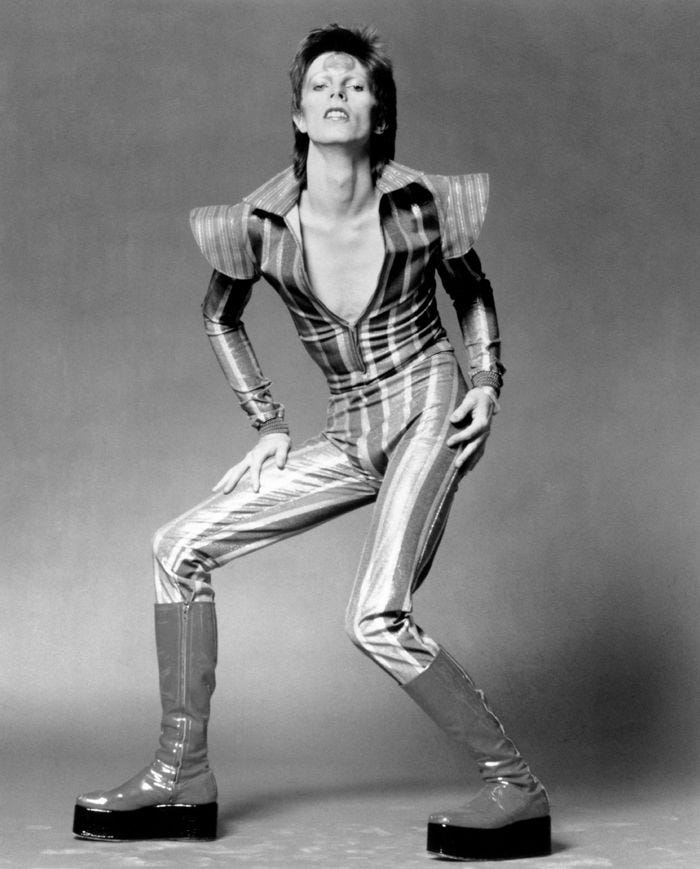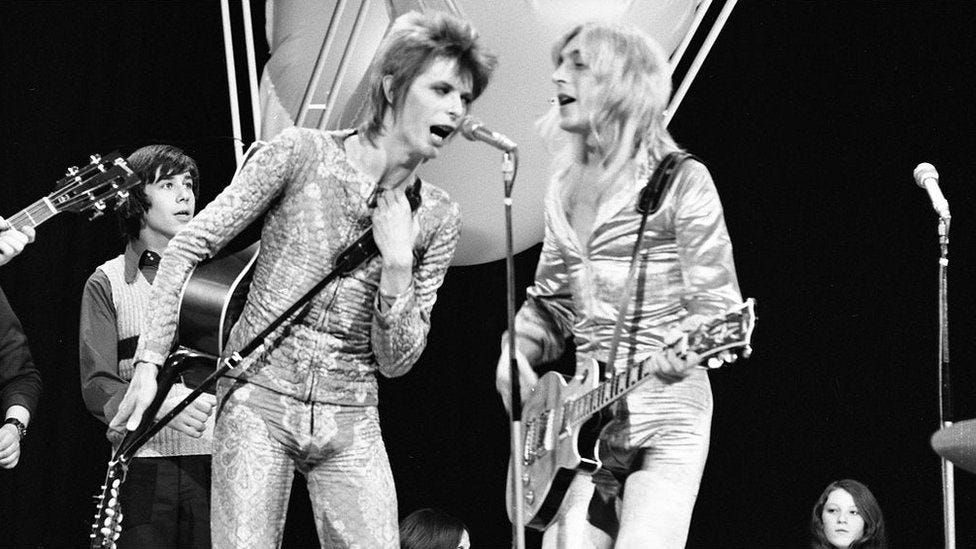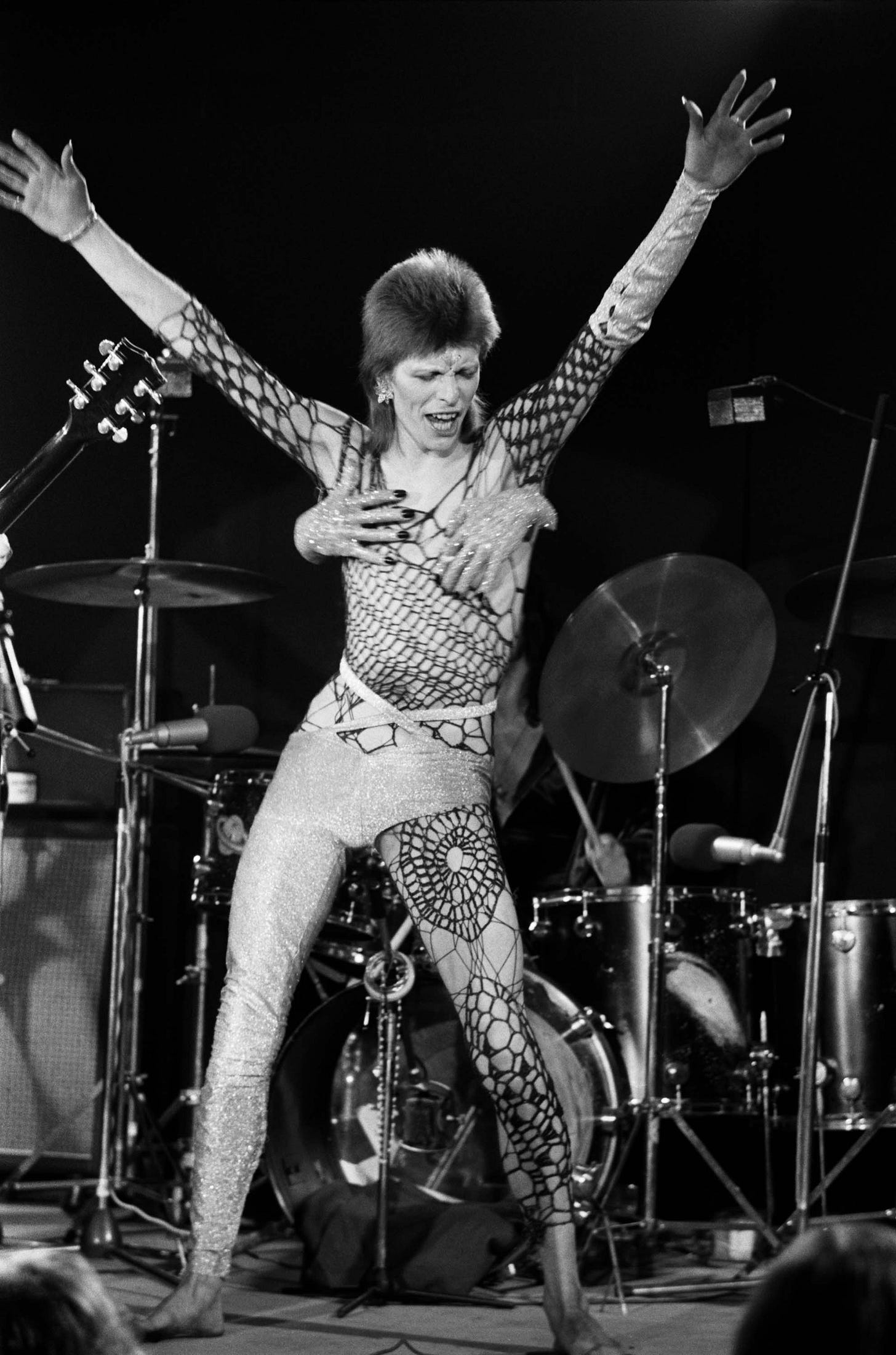‘… that fucker would not leave me alone for years. That was when it all started to sour. And it soured so quickly you wouldn't believe it… My whole personality was affected… It became very dangerous. I really did have doubts about my sanity… I think I put myself very dangerously near the line. Not in physical sense but definitively in mental sense [sic].’
—David Bowie.1
Now it is the 3rd of July 1973. Bowie is at the height of his fame and power to date. The Rise and Fall of Ziggy Stardust & the Spiders from Mars appeared in June 1972. His era-defining performance on Top of the Pops followed the next month. Bowie has since exploded the collective unconscious. Ziggy Stardust is a sexual icon, a liberating ideal for kids across the country. Everywhere in his wake there follows an irrepressible wave of queer desire.2 Fans are crazed, obsessed, hysterical in a way unseen since Beatlemania’s heights. Ziggy gave Bowie the unthinkable success he had lusted after for nearly a decade. Yet after just a year Bowie has reached a point of crisis. This actor is cracking. He knows something must change.
Tonight Bowie will play his final show of the Ziggy Stardust tour at London’s Hammersmith Odeon. But before the concert he stands disguised in the street outside the venue and weeps on a fan’s shoulder. Bowie is on the brink of psychic collapse.3 Ziggy Stardust’s identity has been his own on and offstage for over a year. His immersion in the role has taken a great psychological toll. Ziggy was a character of mythological proportions people saw as a kind of space-age messiah. ‘I became Ziggy Stardust’ he said, and increasingly unable to distinguish between his own life and that of his character, Bowie started believing his own myths.4 He had become ‘obsessed night and day with the character.’ Each performance made him ‘more and more like this monster.’ After a year he was ‘hopelessly lost in the fantasy.’ He had ‘forgotten who David Jones is.’5 Combined with other commercial and private stressors in his life, he is now struggling to cope. He is lost. Bowie’s psyche, Ziggy’s mind – both are splintering, all at once.
Forty minutes before his performance, Bowie suppresses his anguish. He collects himself and enters the venue. A mesmerising show follows, a vibrant surge of glam rock that bursts with sexual energy. But before the final song—Ziggy Stardust’s closing track, ‘Rock ‘n’ Roll Suicide’—Bowie makes an announcement. The concert was to be the last his band would ever play. ‘Of all the shows on this tour, this particular show will remain with us the longest, because not only is it the last show of the tour, but it's the last show that we'll ever do.’ The Spiders realise they have been fired. They nonetheless play the explosive finale. Four minutes later the show ends.
Afterwards Bowie goes backstage. Psychologically unmoored and at the brink of disintegration, carnage follows. He collapses on his vanity table and weeps. He sweeps the lamps and flowers off his dresser and starts to destroy the room. His table, the walls, chairs and windows are all kicked, spat upon, smashed. The room ruined, he turns his aggression toward himself. He beats and claws at his face, eyes and neck, tearing at the canvas he used for his art in a conflagration of rage. Eventually he emerges, eyes bloodshot, face lacerated and a fist-sized bruise on his cheek.6 The message of this violence is clear. Ziggy Stardust was gone.
Bowie ended Ziggy’s life that night with aggression both symbolic and physical. The next day people are baffled by this masochistic decision. Commentators speculate that Ziggy’s death was a cunning form of self-promotion. Others wonder if Bowie was undergoing a personal disintegration. Some ask whether Ziggy died to prevent Bowie’s collapse. Perhaps all three explanations are right. If we accept Bowie’s repeated assertion that he used himself as a canvas to express the truth of his time his self-annihilation appears in a new light. As he would with the Duke, Bowie used Ziggy’s death to express a truth about his psyche and the forces he felt in his society. About the human mind and the nature of liberal capitalism.
References
Doggett, P. (2011) The Man Who Sold the World: David Bowie and the 1970s. London, The Bodley Head.
Goddard, S. (2013) Ziggyology: A Brief History of Ziggy Stardust. London, Ebury Press.
Reynolds, S. (2016) Shock and Awe: Glam Rock and its Legacy. London, Faber & Faber.
Sandford, C. (1997) Bowie: Loving the Alien. London, Warner.
Doggett, P. (2011) The Man Who Sold the World: David Bowie and the 1970s. London, The Bodley Head.
Footnotes
http://www.bowiegoldenyears.com/press/77-10-29-melody-maker.html
See Shock & Awe: Glam Rock & Its Legacy, p.313 for an account of the alleged effects Ziggy Stardust shows had on fans’ sex and sexual fantasies.
Bowie: Loving the Alien, pp.1-4.
Ziggyology, p.299, and https://www.theuncool.com/journalism/david-bowie-playboy-magazine/
https://www.rollingstone.com/music/music-news/david-bowie-ground-control-to-davy-jones-77059/, and The Man Who Sold the World, pp.151-152.
Bowie: Loving the Alien, p.4.









